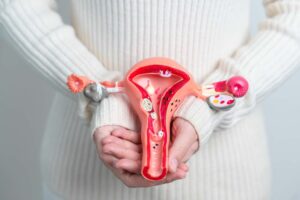The medical term for heavy periods is menorrhagia.
Menorrhagia is relatively common and something that I’m regularly asked about from patients.
As you can imagine, there is a lot of subjectivity when it comes to periods that are heavy.
As a physician, I will ask my patients several questions to help them better understand what they are experiencing and to help them come up with the best treatment plan possible. Some questions include:
- Are you using tampons or pads?
- How often are they being changed?
- Are there problems with soiling, even with the protection?
Certainly, if a woman is changing her pad or tampon every hour, that’s quite heavy. Also, if she’s frequently soiling the bed at night or soiling clothes during the day, that certainly deserves some additional attention.
What Causes Menorrhagia?
Menorrhagia usually doesn’t have a significant underlying cause; the periods are just heavy.
However, there are some exceptions.
A fibroid uterus can make the periods quite heavy.
Having endometrial polyps inside the uterus can also make the periods quite heavy.
Some women have blood disorders, which makes them prone to have other bleeding problems, but also periods that are heavy.
What To Expect At An Ob/GYN Appointment For Heavy Periods?
When a woman comes in for menorrhagia, I’ll start with her medical history and also perform an exam.
Depending on what we discover, there is a possibility that we will order some blood work. Additionally, we may decide to order an ultrasound.
Once we have all of the information we need, then we can start talking about different treatment options for her heavy periods.
Treatment Options For Heavy Periods
Treatment options, of course, depend on what stage of life a woman is at.
A younger woman who is not done with childbearing but does not want to get pregnant will often respond to birth control pills as a treatment.
There are also progesterone IUDs that can work very well to make the lining of the uterus very thin and therefore make the periods very light.
For women who are done with childbearing and are not responding well to medical therapy or IUDs, surgical treatment becomes the next option.
Surgery for Heavy Periods
Endometrial Ablation
One of these options is endometrial ablation.
With this procedure, we burn the lining of the uterus in the operating room. Therefore, the lining of the uterus is not able to get thick and generate a heavy period each month.
Hysterectomy
The most definitive treatment for heavy periods in women who are done with childbearing is a hysterectomy. This is when we take the uterus out itself.
Once the uterus has been removed, there is nothing to bleed during the periods.
Depending on a woman’s age and other medical conditions, we will then have to decide whether to leave the ovaries or take them out. By leaving the ovaries in place, we are not changing the patient’s hormonal status at all.





